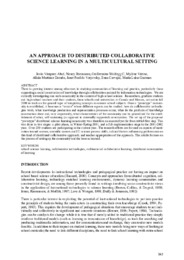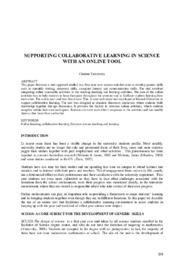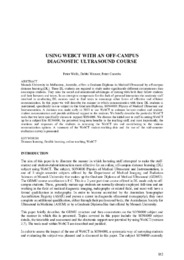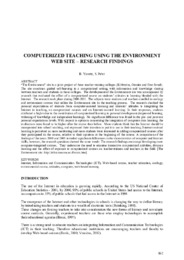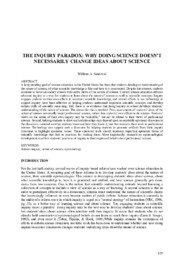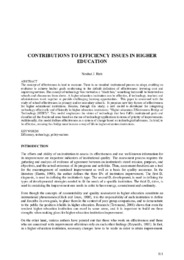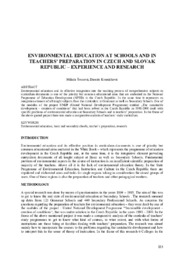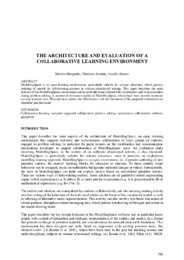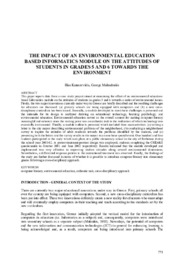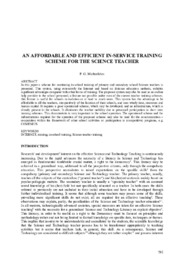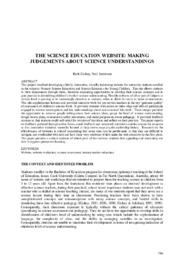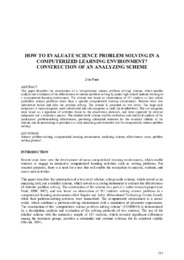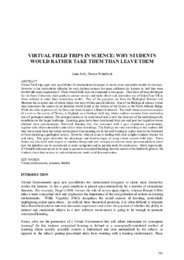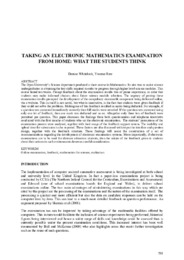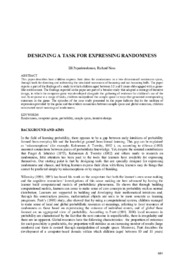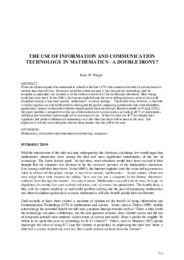Computer Based Learning in Science (CBLIS): Recent submissions
Now showing items 101-120 of 337
-
An approach to distributed collaborative science learning in a multicultural setting
(Department of Educational Sciences, University of Cyprus, 2003)There is growing interest among educators in studying communities of learning and practice, particularly those supporting a social construction of knowledge through collaboration assisted by information technologies. We ... -
Supporting collaborative learning in science with an online tool
(Department of Educational Sciences, University of Cyprus, 2003)This paper discusses a new approach trialled in a first year core science unit that aims to develop generic skills such as scientific writing, numeracy skills, computer literacy and communication skills. The trial involved ... -
Using webct with an off-campus diagnostic ultrasound course
(Department of Educational Sciences, University of Cyprus, 2003)Monash University in Melbourne, Australia, offers a Graduate Diploma in Medical Ultrasound by off-campus distance learning (DL). These DL students are required to study under significantly different circumstances than ... -
Computerized teaching using the environment Web site – research findings
(Department of Educational Sciences, University of Cyprus, 2003)“The Environment” site is a joint project of three teacher-training colleges (Kibbuzim, Oranim and Orot Israel). The site combines guided self-learning in a computerized setting, with information and knowledge sharing ... -
The inquiry paradox: why doing science doesn't necessarily change ideas about science
(Department of Educational Sciences, University of Cyprus, 2003)A long standing goal of science education in the United States has been that students develop an understanding of the nature of science, of what scientific knowledge is like and how it is constructed. Despite this interest, ... -
Contributions to efficiency issues in higher Education
(Department of Educational Sciences, University of Cyprus, 2003)The concept of effectiveness is hard to measure. There is no standard institutional process to adopt, enabling an evaluator to achieve his/her goals conforming to the default definition of effectiveness: lowering cost and ... -
Environmental education at schools and in Teachers’ preparation in czech and slovak Republic – experience and research
(Department of Educational Sciences, University of Cyprus, 2003)Environmental education and its effective integration into the teaching process of comprehensive subjects in curriculum documents is one of the priority but common educational aims that are embodied in the National Programme ... -
When computer use is associated with Negative science achievement
(Department of Educational Sciences, University of Cyprus, 2003)One surprising result of the Third International Mathematics and Science Study (TIMSS) is that computer use in the classroom was negatively associated with high student achievement in Cyprus, Hong Kong and the USA. The ... -
The architecture and evaluation of a Collaborative learning environment
(Department of Educational Sciences, University of Cyprus, 2003)ModellingSpace is an open learning environment, particularly suitable for science education, which permits building of models by collaborating partners in various educational settings. This paper describes the main features ... -
The impact of αn environmental education Based informatics module on the attitudes of students in grades 5 and 6 towards the environment
(Department of Educational Sciences, University of Cyprus, 2003)This paper reports data from a case study project aimed at examining the effect of an environmental educationbased Informatics module on the attitudes of students in grades 5 and 6 towards a series of environmental issues. ... -
New steps in the organisation of the school activity in the french secondary schools: the Changing role of physics teachers
(Department of Educational Sciences, University of Cyprus, 2003)Since the introduction in 2000 of the Personal Guided Projects (TPEs in French) for students, which are a new educational form of learning in the French secondary school, the role of physics teachers has changed. The aim ... -
An affordable and efficient in-service training Scheme for the science teacher
(Department of Educational Sciences, University of Cyprus, 2003)In this paper a scheme for continuing in-school training of primary and secondary school Science teachers is presented. This system, using extensively the Internet and based on distance education methods, exhibits significant ... -
The science education website: making Judgements about science understandings
(Department of Educational Sciences, University of Cyprus, 2003)This project involved developing a lively, interactive, visually interesting website for university students enrolled in the subjects: Primary Science Education and Science Education for Young Children. This site allows ... -
Development of children’s investigative skills through collaboration at a distance between two elementary schools in cyprus
(Department of Educational Sciences, University of Cyprus, 2003)The introduction of new educational technologies in elementary schools constitutes a decisive factor for the preparation of tomorrow's citizens, who will be called upon to respond to the challenges of the newly emerging ... -
How to evaluate science problem solving in a computerized learning environment? Construction of an analyzing scheme
(Department of Educational Sciences, University of Cyprus, 2003)This paper describes the construction of a ‘computerized science problem solving’ scheme, which enables analysis and evaluation of the effectiveness of science problem-solving by junior high-school students working in a ... -
Virtual field trips in science: why students Would rather take them than leave them
(Department of Educational Sciences, University of Cyprus, 2003)Virtual Field trips open new possibilities for instructional designers to create more interactive worlds for learners. However is the interactivity afforded by such desktop systems for users sufficient for learners to feel ... -
Taking an electronic mathematics examination from home: what the students think
(Department of Educational Sciences, University of Cyprus, 2003)The Open University’s Science department produced a short course in Mathematics. Its aim was to assist science undergraduates in obtaining the key skills required in order to progress through higher level science modules. ... -
Designing a task for expressing randomness
(Department of Educational Sciences, University of Cyprus, 2003)This paper describes how children express their ideas for randomness in a two-dimensional continuous space, through tools for directing and redirecting the simulated movement of bouncing and not bouncing balls. The paper ... -
The use of information and communication technology in mathematics - a double irony?
(Department of Educational Sciences, University of Cyprus, 2003)When the microcomputer was introduced to schools in the late 1970’s the connection between it and mathematics seemed more than obvious. Educators would have been excused if they thought that technology (and the computer ... -
Metabook. Evaluating the possibilities of e-books in schools
(Department of Educational Sciences, University of Cyprus, 2003)The objective of METABOOK project is to investigate the possibilities of e-books in the classroom and in the education field in general, as a possible replacement of traditional “paper books”, in order to minimize the cost ...
